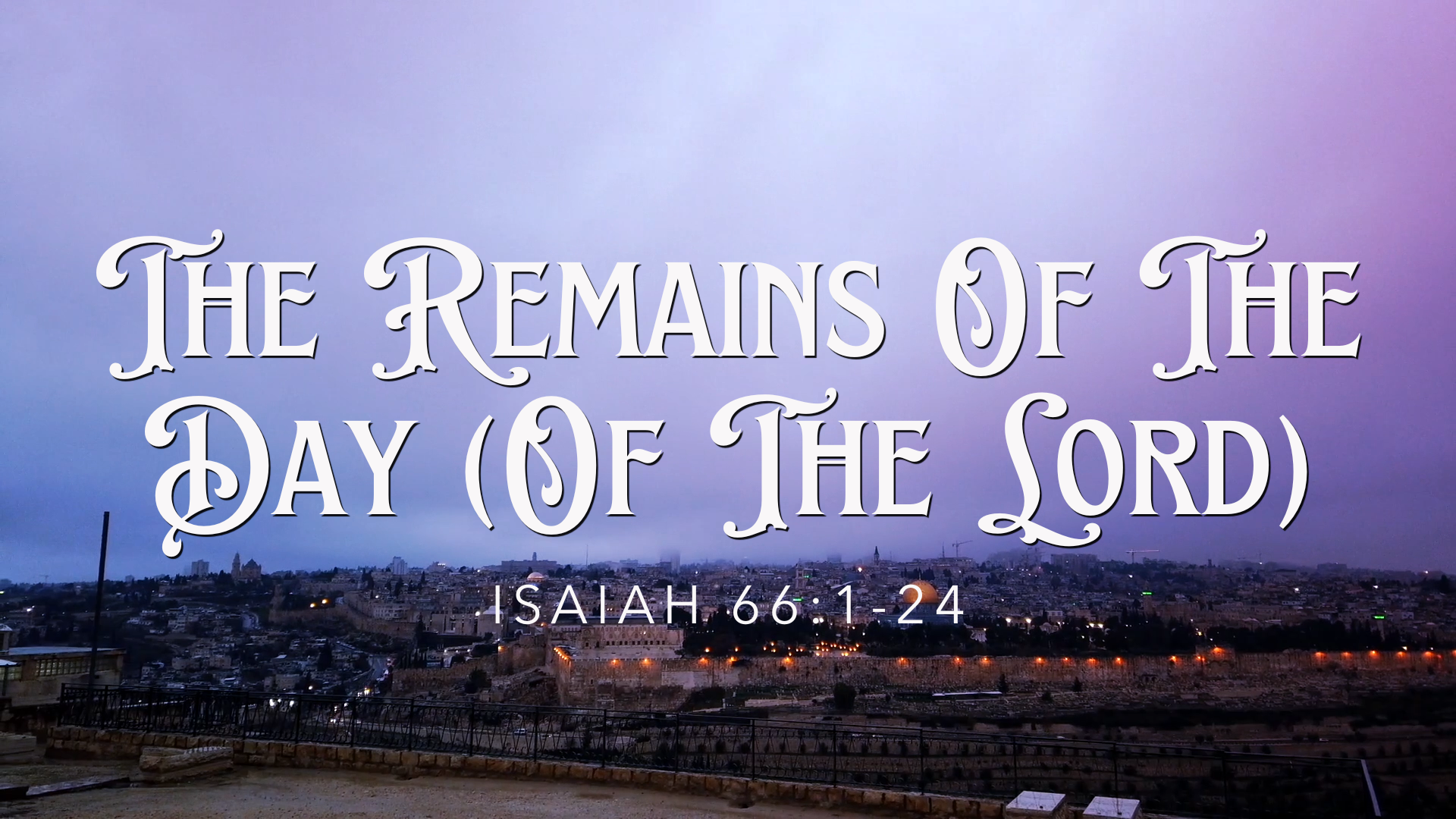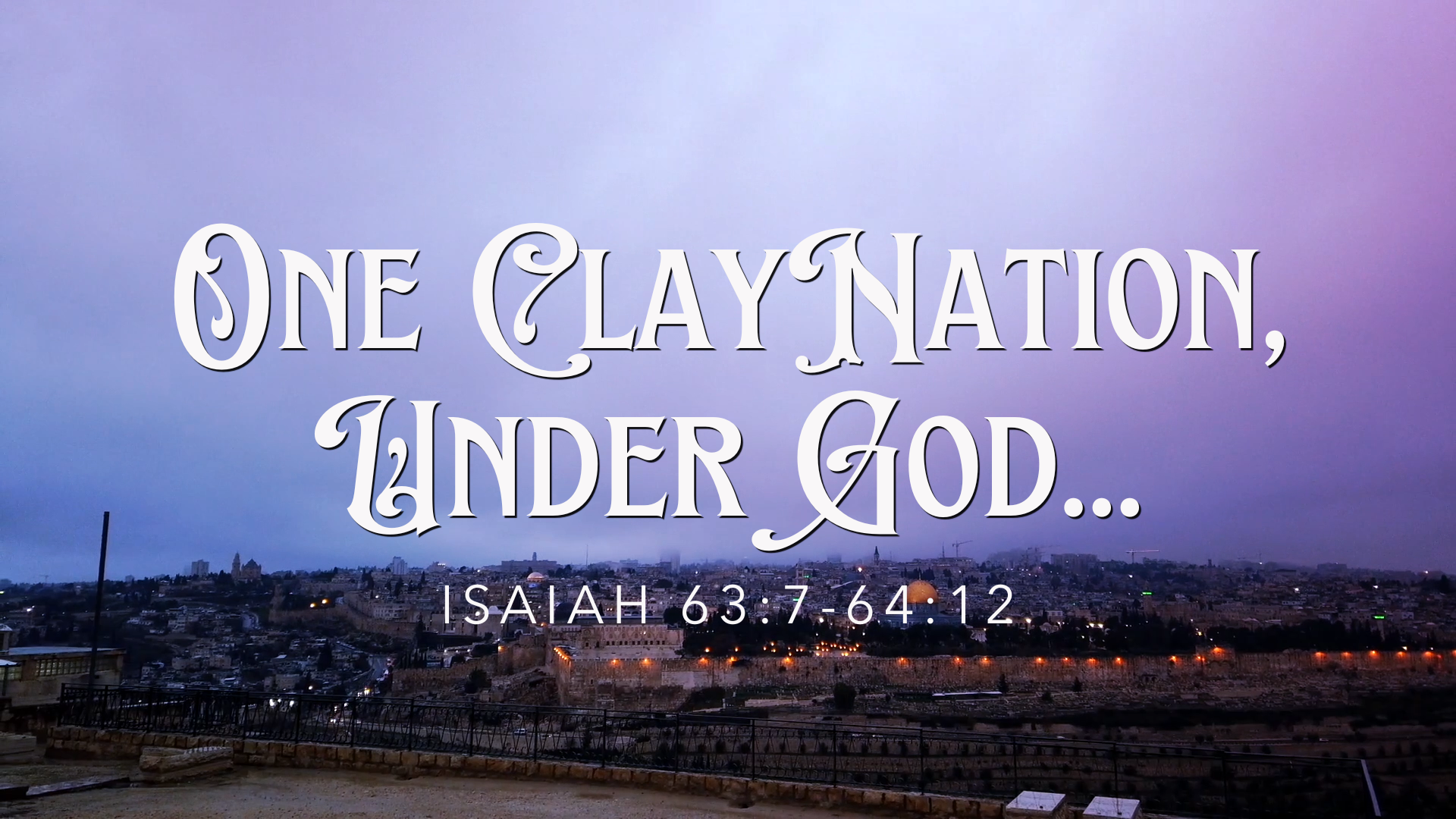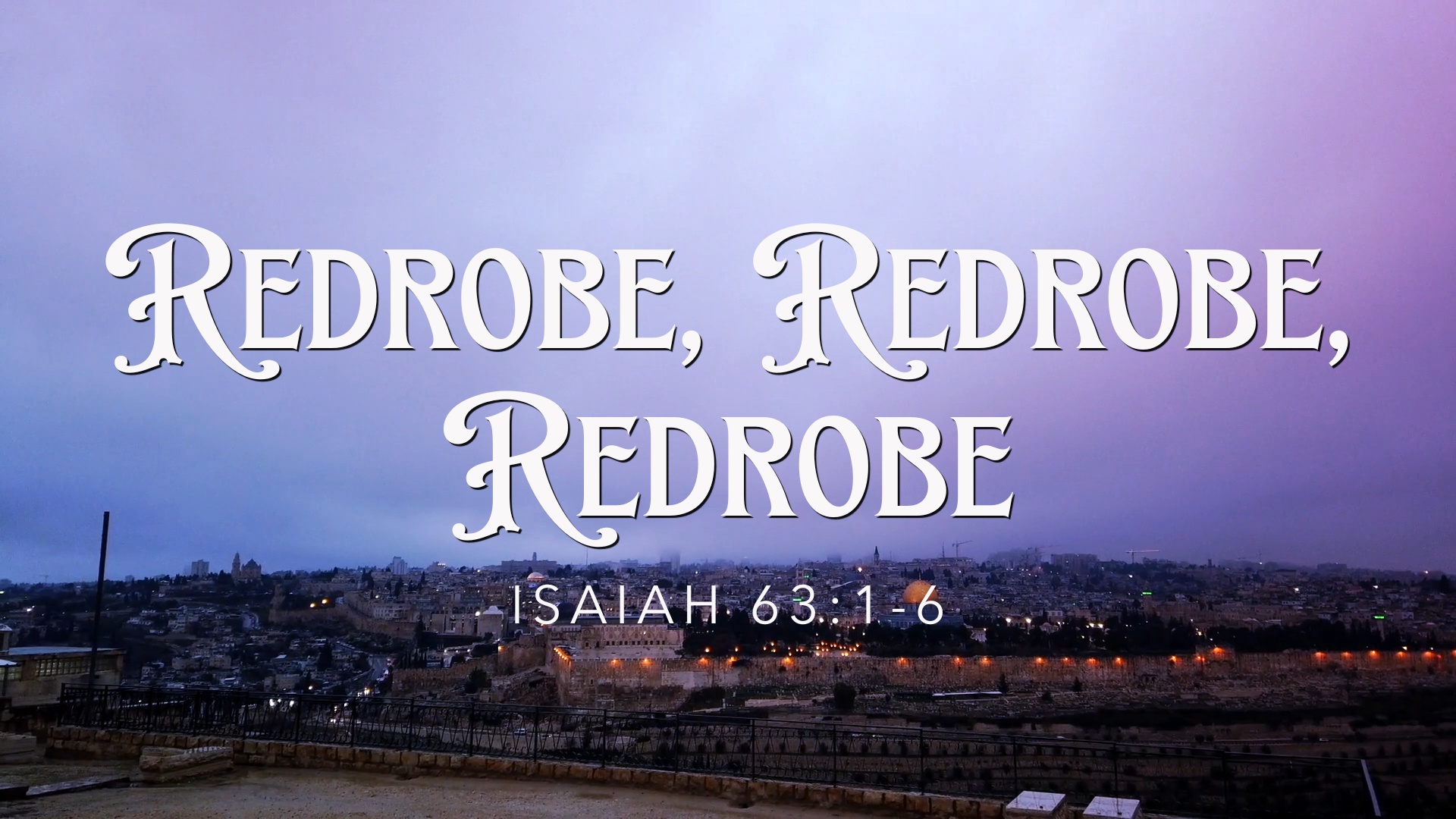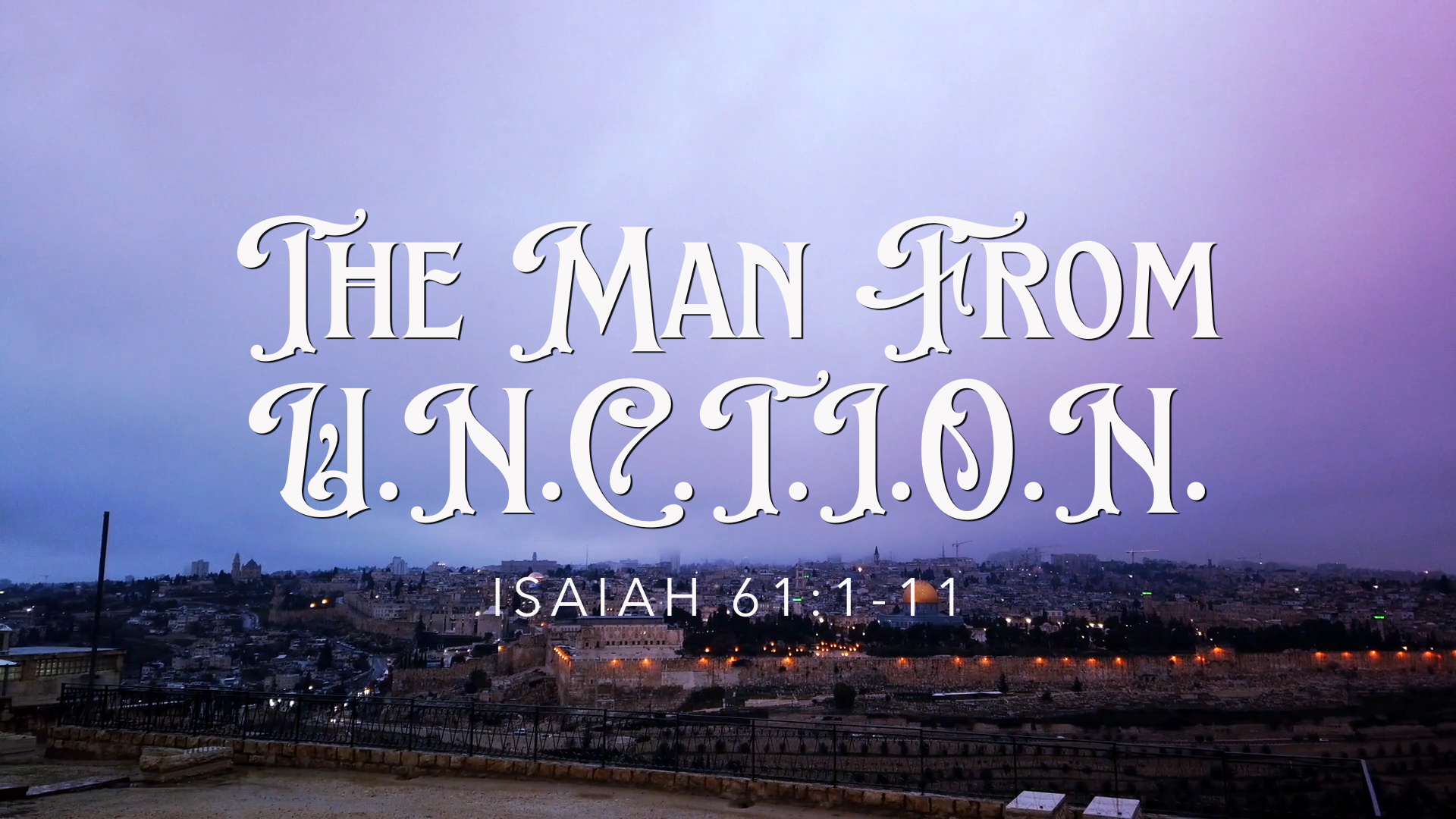
The Remains Of The Day (Of The Lord) (Isaiah 66:1-24)
At the end of Life of Pi, 16yr old Pi Patel tells two different versions of his ocean survival story to officials investigating the shipwreck.
⇉ The first account involves him surviving 227 days at sea in a lifeboat with a zebra, an orangutan, a hyena, and a Bengal tiger named Richard Parker. The hyena kills the zebra and later the orangutan. Richard Parker kills the hyena.
⇉ The officials do not believe his account. Pi retells the story. The animals are replaced by humans. The cook kills the sailor and feeds on his flesh. He then kills Pi’s mother, after which Pi kills him and uses his remains as food and fish bait.
At which point your book club disbands.
It’s a good thing that the Book of Isaiah does not have a bizarre ending. Let’s look at it: “And they shall go forth and look upon the corpses of the men who have transgressed against Me. For their worm does not die, and their fire is not quenched. They shall be an abhorrence to all flesh.”
On our way to this open burial site, we will first visit two Temples:
- A Tribulation Temple in verses 1-9.
- A Millennial Kingdom Temple in verses 10-24.
It is The Tale of Two Temples – one that God detests and one that He delights in.
I’ll organize my comments around two points: #1 Be Certain That What You Are Building Is According To God’s Preference, and #2 Be Certain That What You Are Building Is Affording God Praise.
#1 – Be Certain That What You Are Building Is According To God’s Preference (v1-9)
Isaiah’s ministry to Judah took place before Solomon’s Temple was destroyed. King Nebuchadnezzar would do the dishonor in 586BC. Jews were taken captive and brought to Babylon.
The Jews returned to Jerusalem after 70yrs of captivity. They rebuilt their Temple, the Second Temple, sometimes called Zerubbabel’s Temple on account of him being governor.
Jerusalem would come under Roman control. Herod remodeled the Second Temple, going all out. It was called Herod’s Temple. It was destroyed by the Romans in 70AD.
Which of these Temples is Isaiah referencing?
Neither. He looks forward and predicts another Temple. It will exist in the future 7yr Great Tribulation. We call it the Tribulation Temple.
Isa 66:1 Thus says the LORD: “Heaven is My throne, And earth is My footstool. Where is the house that you will build Me? And where is the place of My rest?
Isa 66:2 For all those things My hand has made, And all those things exist,” Says the LORD…
The LORD wasn’t anti-Temple. But you & I cannot build Him a Temple without His impetus and instruction and then assume He will put His presence there.
The same is true of your Christian life & walk; It must be biblical, Spirit-led, & in His timing.
Isa 66:2 … “But on this one will I look: On him who is poor and of a contrite spirit, And who trembles at My word.
Temple or no, God looks for tremblers:
- They know their spiritual poverty.
- They are “contrite,” i.e., they don’t think more highly of themselves than they ought.
- They are pre-submitted to God’s Word.
At first I read it as tremors and thought, “Man, I’ve got this!”
We tremble when cold or weak. But we also tremble with excitement. It’s a romance word.
In your embrace, I tremble,
my heart a captive of your tender touch
Isa 66:3 “He who kills a bull is as if he slays a man; He who sacrifices a lamb, as if he breaks a dog’s neck; He who offers a grain offering, as if he offers swine’s blood; He who burns incense, as if he blesses an idol…
They bring bulls and lambs, and the other prescribed things. They’d be horrified at what their sacrifices look like to the LORD. Can you see them bringing a dog and breaking its neck? That’s how awful their hypocritical worship was.
God is not pleased with the Tribulation Temple since the worshippers there are hypocrites.
Isa 66:3 … Just as they have chosen their own ways, And their soul delights in their abominations,
Isa 66:4 So will I choose their delusions, And bring their fears on them; Because, when I called, no one answered, When I spoke they did not hear; But they did evil before My eyes, And chose that in which I do not delight.”
There is a principal of God’s discipline by which He steps back and gives us what we want. You’re delusional to think humanity can find a way without God.
The CEV reads like this in verse five – “Some of your own people hate and reject you because of me. They make fun and say, ‘Let the LORD show his power! Let us see him make you truly happy.’ But those who say these things will be terribly ashamed.”
An equivalent today, for us, would be for professing Christians to call us Jesus Freaks.
Isa 66:6 The sound of noise from the city! A voice from the temple! The voice of the LORD, Who fully repays His enemies!
There’s Tumult at the Temple! Dr. Arnold Fruchtenbaum writes, “The voice that the [unbelieving] non-remnant will hear is the voice of YHWH rendering recompense or judgment.”
Isa 66:7 “Before she was in labor, she gave birth; Before her pain came, She delivered a male child.
Isa 66:8 Who has heard such a thing? Who has seen such things? Shall the earth be made to give birth in one day? Or shall a nation be born at once? For as soon as Zion was in labor, She gave birth to her children.
We need to keep our metaphors distinct with careful reading:
- In the NT, the 7yr Great Tribulation is described like a woman having severe birth pangs over a period of time (Matthew 24:8).
- In our Isaiah passage, Israel is described as having no birth pangs, and delivering suddenly.
The birth in Isaiah is something else. Two things, really. One is political, and one is spiritual:
- “Shall a nation be born at once?” Yes, it can, and in the case of modern Israel – it was born in a day. May 14, 1948. That’s the politics.
- Who is “the male child?” Don’t answer yet! The “male child” born without birth pangs, “at once,” is also called in this verse, “children,” plural. Thus it isn’t Jesus. This is the new birth, the spiritual birth, of the Jews who flee Jerusalem ahead of the antichrist’s attack.
While holed-up in Petra, the prophet Hosea says they receive Jesus at once as Messiah & Savior. They are immediately born again spiritually. “Come, and let us return to the LORD; For He has torn, but He will heal us; He has stricken, but He will bind us up. After two days He will revive us; On the third day He will raise us up, That we may live in His sight” (6:1-2).
Isa 66:9 Shall I bring to the time of birth, and not cause delivery?” says the LORD. “Shall I who cause delivery shut up the womb?” says your God.
“No” & “No.” Jesus will save the elect nation of Israel. “All Israel” who endure to the end of the Tribulation will be saved.
We – the Church – will be in Heaven while all this goes down on the Tribulation Earth. There are lessons for us involving building with or for God.
#2 – Be Certain That What You Are Building Is Affording God Praise (v10-24)
Isaiah mentions “priests and Levites,” “offerings,” and a religious calendar. These are all things associated with a Temple. The Millennial Temple is ordained by God. It is described in great detail by Ezekiel (chapters 40-48).
Isa 66:10 “Rejoice with Jerusalem, And be glad with her, all you who love her; Rejoice for joy with her, all you who mourn for her;
Isa 66:11 That you may feed and be satisfied With the consolation of her bosom, That you may drink deeply and be delighted With the abundance of her glory.”
Isa 66:12 For thus says the LORD: “Behold, I will extend peace to her like a river, And the glory of the Gentiles like a flowing stream [In the future Millennium the Gentile nations of the Earth recognize Jerusalem as capital of the world & bring their abundance there] Then you shall feed; On her sides shall you be carried, And be dandled [bounced] on her knees.
Isa 66:13 As one whom his mother comforts, So I will comfort you; And you shall be comforted in Jerusalem.”
Isa 66:14 When you see this, your heart shall rejoice, And your bones shall flourish like grass; The hand of the LORD shall be known to His servants, And His indignation to His enemies.
Isa 66:15 For behold, the LORD will come with fire And with His chariots, like a whirlwind, To render His anger with fury, And His rebuke with flames of fire.
Isa 66:16 For by fire and by His sword The LORD will judge all flesh; And the slain of the LORD shall be many [This is Second Coming language]
Isa 66:17 “Those who sanctify themselves and purify themselves, To go to the gardens After an idol in the midst, Eating swine’s flesh and the abomination and the mouse, Shall be consumed together,” says the LORD [The “mouse” may refer to what is known as myomancy, the practice of reading omens from the behavior of rodents]
Isa 66:18 “For I know their works and their thoughts. It shall be that I will gather all nations and tongues; and they shall come and see My glory [Throughout the 1000yrs of the Millennium, Gentile nations will come to Jerusalem to bend the knee to Jesus]
Isa 66:19 I will set a sign among them [We are unsure of the “sign,” but it reminds us that our God is mighty to save in every dispensation] and those among them who escape [Those who “escape” means Jews & Gentiles who endured to the End of the Great Tribulation. They escaped/endured in mortal bodies, as so they enter the Kingdom in those bodies] I will send to the nations: to Tarshish and Pul and Lud, who draw the bow, and Tubal and Javan, to the coastlands afar off who have not heard My fame nor seen My glory [These nations are literal, but they represent nations farthest away all over the Earth] And they shall declare My glory among the Gentiles [People born in these far away locations the future Kingdom will have a sin nature & need to be evangelized]
Isa 66:20 Then they shall bring all your brethren for an offering to the LORD out of all nations, on horses and in chariots and in litters, on mules and on camels, to My holy mountain Jerusalem,” says the LORD, “as the children of Israel bring an offering in a clean vessel into the house of the LORD [Saved Gentiles will accompany Jews on pilgrimages to the Millennial Temple]
Isa 66:21 And I will also take some of them for priests and Levites,” says the LORD [Amazing – some Gentiles will serve as priests & Levites!]
Isa 66:22 “For as the new heavens and the new earth Which I will make shall remain before Me,” says the LORD [In the last chapter we saw that in the Millennial Kingdom Jesus would restore the current Earth & heavens. After the thousand years He will create a new Earth and heavens] “So shall your descendants and your name remain.
Isa 66:23 And it shall come to pass That from one New Moon to another, And from one Sabbath to another, All flesh shall come to worship before Me,” says the LORD.
Temple worship will be established, complete with sacrificial offerings and a full religious calendar.
Will we bring offerings & keep the Sabbath and such? No. The Church had no such practices in the Book of Acts; why would we in the Kingdom? The Church was and remains distinct from the nation of Israel, and from Gentiles who are saved before & after the Church Age. We are not superior or inferior, and everyone is saved the same way – by grace through faith. But Jews, the Church, and Gentile nations remain distinct in the Millennium & eternity.
Isa 66:24 “And they shall go forth and look Upon the corpses of the men Who have transgressed against Me…
“They” are the “all flesh,” i.e., the mortal inhabitants of the Millennium, who come to visit Jesus in Jerusalem. They will, while traveling, see the“corpses” of the Tribulation transgressors.
There are a few facts to consider before we can offer an interpretation:
- The Great Tribulation is 7yrs long. At the mid-point, 3½ yrs, the antichrist goes to the Tribulation Temple, says he is God, and demands to be worshipped.
- The Lord said, to the nation of Israel, “Let those who are in Judea flee to the mountains” (Matthew 24:16). Most scholars suggest that they flee to Bozrah, to the rock city of Petra.
- They are pursued by the Satan-possessed antichrist.
- The Lord returns to Earth to Bozrah, where the armies of the antichrist have the Jews surrounded. They call out to the Lord, are born again.
- Jesus delivers the remnant and mounts a campaign back to Jerusalem, overcoming enemies as He goes.
In a previous study, we were made to understand that what we refer to as the Battle of Armageddon is really better understood as a longer campaign rather than a single battle.
From Bozrah to Jerusalem, Jesus single-mouth-ed-ly defeats the armies of the world.
The campaign we call the War of Gog & Magog, described in Ezekiel 38&39, takes place during this last part of the Tribulation[1] – adding to the death toll.
It is difficult for us to grasp the extent of the carnage that will take place. The Bible refers to it as a wine press that squeezes out the blood of the Lord’s enemies. “Blood poured from the winepress, [reaching] as high as horses’ bridles, for a distance of [about 200 miles]” (Revelation 14:19-20).
In Ezekiel we read, “For seven months the house of Israel will be burying them, in order to cleanse the land. Indeed all the people of the land will be burying… They will set apart men regularly employed, with the help of a search party, to pass through the land and bury those bodies remaining on the ground, in order to cleanse it. At the end of seven months they will make a search. The search party will pass through the land; and when anyone sees a man’s bone, he shall set up a marker by it, till the buriers have buried it in the Valley of Hamon Gog. Then those who dwell in the cities of Israel will go out and make fires of the weapons and burn them… And they will make fires of them for seven years.”
(What do you think – The Corpse Corp?)
This valley is also called The Valley of the Travelers, The Valley of the Passengers, and The Valley of Them Who Pass Through.
Isa 66:24 … For their worm does not die, And their fire is not quenched. They shall be an abhorrence to all flesh.
Are there eternal flesh eating “worms?” No. This refers to maggots. They don’t “die” is a way of saying that they have an abundant food supply. Bodies will be burned, too. But not by eternal fire.
Thus is not a look into Hades or the Lake of Fire. There is no mention of “souls,” only corpses. This is a mass gravesite. It seems to be an open grave since travelers can see the corpses.
You’ve undoubtedly seen pictures of the piled-up corpses of Jews from the Holocaust. Even with that evidence, there are those who say it never happened.
And guess what? At the end of the one thousand years, an innumerable number of unbelievers attack Jesus at Jerusalem – willfully ignorant of prophetic history, and with corpses to prove it.
I’ll close the Book of Isaiah with this appropriate quote: “The Christian watches with great interest the providences of God towards the Jews, knowing that their return to their land is a preparation for the fulfillment of much prophecy, and Jesus Christ’s coming. ‘Come, Lord Jesus.’”
| ↑1 | John Walvoord, Arnold Fruchtenbaum, & Charles Feinberg are among the Dispensational scholars who teach this. |
|---|








